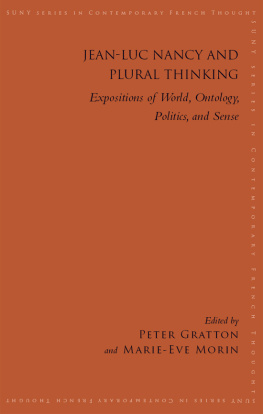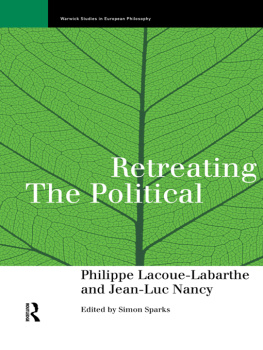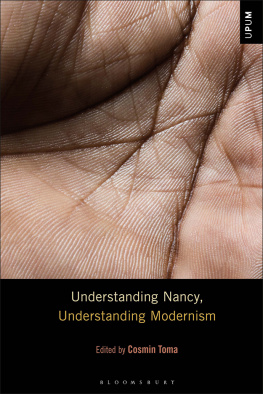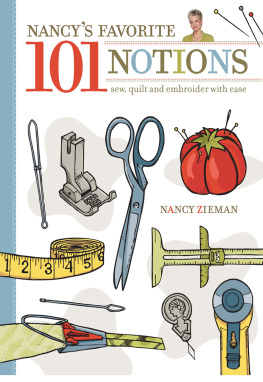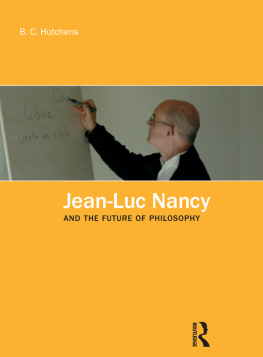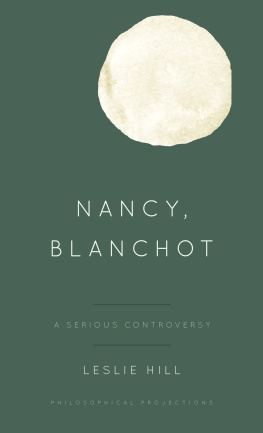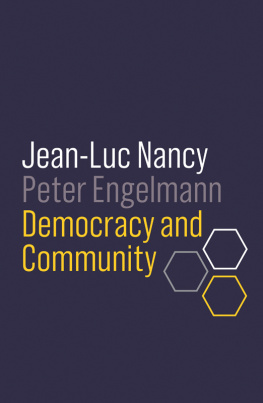The Possibility of a World

Copyright 2017 Fordham University Press
All rights reserved. No part of this publication may be reproduced, stored in a retrieval system, or transmitted in any form or by any meanselectronic, mechanical, photocopy, recording, or any otherexcept for brief quotations in printed reviews, without the prior permission of the publisher.
This book was first published in French under the title La possibilit dun monde: Dialogue avec Pierre-Philippe Jandin , Les petits Platons, Paris, 2013.
Fordham University Press has no responsibility for the persistence or accuracy of URLs for external or third-party Internet websites referred to in this publication and does not guarantee that any content on such websites is, or will remain, accurate or appropriate.
Fordham University Press also publishes its books in a variety of electronic formats. Some content that appears in print may not be available in electronic books.
Visit us online at www.fordhampress.com.
Library of Congress Cataloging-in-Publication Data
Names: Nancy, Jean-Luc, interviewee. | Jandin, Pierre-Philippe, interviewer.
Title: The possibility of a world : conversations with Pierre-Philippe Jandin / Jean-Luc Nancy, Pierre-Philippe Jandin.
Other titles: Possibilit dun monde. English
Description: First edition. | New York, NY : Fordham University Press, 2017. | Includes bibliographical references.
Identifiers: LCCN 2016051066 | ISBN 9780823275403 (cloth : alk. paper) | ISBN 9780823275410 (pbk. : alk. paper)
Subjects: LCSH: Nancy, Jean-LucInterviews. | Political sciencePhilosophy.
Classification: LCC B2430.N364 A5 2017 | DDC 194dc23
LC record available at https://lccn.loc.gov/2016051066
Printed in the United States of America
19 18 17 5 4 3 2 1
First edition
Contents
In accordance with Jean-Luc Nancys wishes, we have attempted to preserve the spontaneity of oral discussion. We therefore kept colloquial expressions and tried to avoid rewriting the recording altogether.
Pierre-Philippe Jandin
PIERRE-PHILIPPE JANDIN : Knowing your taste for pastiche and parody, Im almost tempted to introduce our discussion like Heidegger when he offers a biography of Aristotle: Jean-Luc Nancy was born, he worked, and hes still working. Because its very true that you demonstrate constant attention to the worldto our world, which has almost disappeared, and to the coming world. In any case, to understand your approach, and without mistaking thinker and philosopher for synonyms today, the academic question that presents itself is: How did you become a philosopher? Especially since you gave a lecture in 2002 at the Centre Pompidou entitled: I Never Became a Philosopher. Whats this non-becoming, then?
JEAN-LUC NANCY : The title of that talk was a bit provocative and presumptuous. But something suddenly struck me when the Centre Pompidou posed this question: I didnt become a philosopher because Ive always been one. All that Ive known, or all that Ive experienced, took place against a background that I wouldnt call philosophical, though its close to ita background of interest in the things of thought, in conceptions.
P.-P.J. : I think you also speak about an experience of the uncanny felt in your relationship to the world; like when you were a child and rode in a car at night, you wondered where the trees, which were lit by the beams of the headlights, went once they were out of sight.
J.-L.N. : Many children ask themselves these kinds of questions. During my first years in Baden-Baden, I remember very well that when we returned home, we would walk up a street alongside a vast wrought iron fence that ran in front of several yards. The fence had these elaborate patterns, and Id get lost in speculations about the necessity or non-necessity of all these adornments. I wondered whether it was necessary to make them or not, or what could be done with the metal that would be recuperated if all of these things were removedthe spectacle of these ornamentations wielded a sort of fascination. I believe theres something one can find in each of us that comes from having been a bit cut off from the world, without this being a painful or unhappy detachment, and at the same time without it being a sort of withdrawal. Very early on in life, I took great pleasure in walking in the countryside all alone, or with a dog I adopted in high school, who became my companion. I still had friends and many acquaintances. But Ive always had a taste for meandering alone in nature, or for being immersed in manual laborfor example, with the farmers from a neighboring farm where I enjoyed cutting tobacco, harvesting grapes, picking corn, and so on. Ive always enjoyed manual labor for how it entails withdrawing from all of the rest of the world. When youre immersed in a material task, you start to think only about How will I do this? Which way should I go? How should I chop the wood with my axe, or put the grapes in the basket?I felt all of this intensely. On the other hand, Ive also always been totally absorbed while reading. For me, these two sensations are associated: In reading as well, theres a kind of solitude, a withdrawal, an entrance into another world that was, in my high school years, for example, the world of Balzac or Zola.
Philosophy was there at least in the form of thought for its own sake. A thought that wasnt applied to any determinate object. I did apply it to objects in the context of militant actionfor example, to the collge unique , to the democratization of education, or to biblical objects. But throughout all of this, there was perhaps no object. My taste was certainly frenzied and encyclopedic: I often read dictionaries, such as the two-volume Grand Larousse for example, the illustration with the fortified castles. But it wasnt for the pleasure of learningI never became a real savant. My enjoyment was in seeing words like machicolation , bartizan , and so on. There was a taste for language, but this taste remained tied to what I would call a thought without an object, spinning in its own tracks.
P.-P.J. : Youve been talking about the terms in which you first related to the world. Id now like to ask you how the world was when you entered into it. By what path, which was more or less chosen, did you make your way into the world?
J.-L.N. : The world, when I entered into it, was the world of World War II. Its as if Id been conceived at the start of the war in late 1939I was born in July of 1940. But the date on which youre born doesnt have much overall importance because you arent aware of the world you enter. I was born in the thick of war, in the occupied zone in Bordeaux. My parents had been forced to evacuate after the surrender of June 1940. Then I grew up there until the Liberation in 1945. The world of my early childhood is thus a bit unusual, the world of occupied France, but I was unaware of it. I have a very vague memory of hearing someone talking about the Kommandantur or the fact that a friend of my parents was in the resistance, which I learned only after the war of course. My parents were not in the resistance; I wandered in this atmosphere that was ordinary and removed from the events of the world, which was similar for many children who were born at the beginning of the conflict. At the end of the war, I have a fairly good memory of the Liberation parade in Bordeaux, but this parade was just another form of entertainment. I have a memory of the first election, the ballots that were distributed and also, immediately, of the first contact with America, because I went to the movie theater in Bordeaux with my grandfather and saw Dumbo , the animated cartoon by Walt Disney What always struck me is that the Americans were very organized and things arrived quicklymovies too, not only chocolate and chewing gum!
Next page

